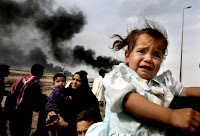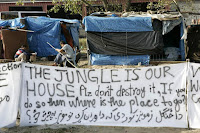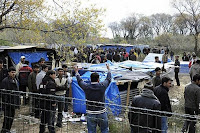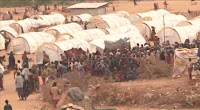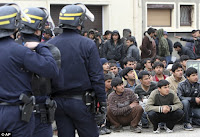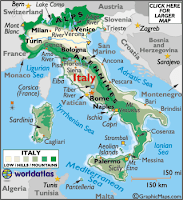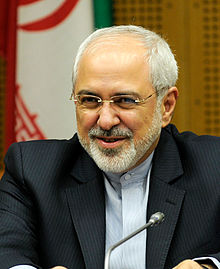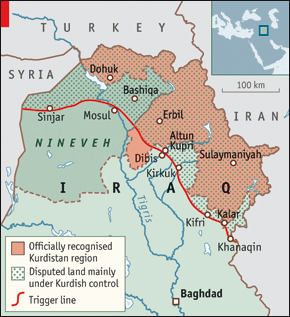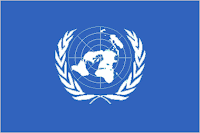War,
criminal neglect, failure to CARE
Editing,
excerpting, brief comment by
Carolyn Bennett
Katrina 10 years on
REMEMBERING August 2005 HURRICANE KATRINA: levee
system fails in the worst civil
engineering disaster in U.S. history, causing hundreds of deaths in the city of New Orleans, more than a thousand total deaths, more thousands of displaced people from the Gulf region; and children were traumatized as if caught in WAR
Atlantic
article by Katy Reckdahl “Lost Children of Katrina a decade after the hurricane…”
April 2, 2015

“Traumatized
children ‘tend to stall out.’” Research on trauma “shows that many traumatized
children experience ‘cognitive bumps’ well into adulthood,” says New
Orleans-based education researcher Lisa Celeste Green-Derry.”
“…Children
from more fragile families are more likely to be traumatized and to recover
more slowly”, says Lori Peek, Colorado State University sociologist and co-director of the
Center for Disaster and Risk Analysis.
esearch collaborators
Alice Fothergill and Lori Peek studied 650 displaced New Orleans-area children
and “found that poorer children were more likely to be exposed to Katrina’s
floodwaters” and that these children then experienced “challenges concentrating
in schools, higher anxiety levels, and more behavioral problems.”
Lisa Celeste
Green-Derry is reported saying, “Many of the Americans who today lack both jobs
and diplomas may have been Katrina-era adolescents who often suffered such high
levels of trauma and instability that learning became nearly impossible. It was
‘like throwing seeds at cement.’”
Green-Derry
is a native of New Orleans and has studied how teacher preparation meets the
academic needs of students traumatized by a natural disaster and she notes the
obvious, that “‘systems’” are essential “to uplifting traumatized students.”
However, New
Orleans' young people 10 years ago “came home to layers of faltering systems:
flood-damaged blocks, a school district in flux, and homes with limited adult
supervision as parents worked, rebuilt damaged houses, or struggled with their
own trauma.” In the academic year
2006-2007, young people, still traumatized, were returning to schools in New Orleans with “unseasoned and overtaxed teachers” in state-run recovery schools and the
results, in the view of experienced educators, were not unexpected.
Who is taking care of the
potentially enormous damage being done to a generation of children?” [University
of Sulaymaniya psychology professor Sherif Karachatani]
Iraq more than 12 years on
Foreign Wars on Iraq: Mesopotamian
campaign (1914–1918); Anglo-Iraqi War (1941); Iran–Iraq War (1980–1988); Gulf
War (1990–1991); Iraqi no-fly zones conflict (1991–2003); Iraq War (March 20,
2003-December 18, 2011; Iraqi insurgency (2011–2013); Iraq War (2014–present)
American-led intervention in Iraq (2014–present)
In 2006, the
peace advocate and prominent Iraqi psychologist Dr. Harith Hassan expressed his
fears about the trauma of war being sustained by Iraq’s young.
“For more
than three decades,” he is reported saying, “…young Iraqis have been forced to
learn how to kill. We must now learn instead about dialogue and compromise.
Otherwise, we will continue to produce psychopathic personalities for whom
violence is simply a means of negotiating daily life.”
Citing a psychological
study of Iraqi children, the 2007 Guardian article reports Iraqi children “seriously
suffering psychologically, with all the insecurity—especially with the fear of
kidnapping and explosions”. And in some cases these children are “suffering
extreme stress.”
University
of Sulaymaniya psychology professor Sherif Karachatani said,
‘Every
day another innocent child is orphaned or sees terrible things children should
never see.’

Mirroring
the state of New Orleans (and of U.S. returning military personnel), Dr
Karachatani says of Iraq, “The country’s overstretched hospitals cannot cope
with psychological trauma, many of the best doctors have either fled the
country or been killed; and compounding the problems is “the stigma” attached
to psychological and psychiatric care. Relatives and others do not “bring their
children in for treatment” because they fear being “labeled as mad.”
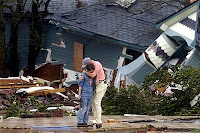
The Guardian
article was pegged to an Association of Iraqi Psychologists (API) study
published in that period finding that “violence had affected millions of Iraqi children,
raising serious concerns for future generations.” The researchers called on the
international community “to help establish child psychology units and mental
health programs.”

r. Harith
Hassan’s words are instructive not only to the young but to the old, to the citizen
of in any land, any office, position, or work:
‘We
must learn … about dialogue and compromise. Otherwise, we will continue to
produce psychopathic personalities for whom violence is simply a means of
negotiating daily life.’
Sources and
Notes
The Atlantic,
April 2, 2015
“The Lost
Children of Katrina— A decade after the hurricane, New Orleans'
community grapples with the effects of missed schooling and mass displacement,”
Katy Reckdahl, April 2, 2015, http://www.theatlantic.com/education/archive/2015/04/the-lost-children-of-katrina/389345/
Counter Spin, April 21, 2015
“Katrina:
10 Years of Media Neglect,” CounterSpin, April 21, 2015, http://fair.org/home/katrina-10-years-of-media-neglect/
“Children
of war: the generation traumatised by violence in Iraq—Growing up in
a war zone takes its toll as young play games of murder and mayhem,” , Michael
Howard in Baghdad [cited API’s Marwan Abdullah in UN-funded news agency IRIN], February 6, 2007, http://www.theguardian.com/world/2007/feb/06/iraq.topstories3
Al-Harith
Hassan
Dr.
Al-Harith Hassan, Zoom Info Profile last updated on June 24, 2005, contains
information
Dr. Hassan [was]
the Dean of the Psychological Center at the University of Baghdad, Iraq, and head
of two NGOs: Health and Safety, and the Iraqi Parapsychology Society.
He also
taught psychiatry and cognitive psychology and comparative religions at Babel
College of Philosophy and Theology in Baghdad. At Eastern Mennonite University
in Harrisburg, Virginia, he took part in a summer Peace-building Institute in
Religion and Peace-Building and Conflict Transformation.
Barcelona
Transcript, www.globalinterfaithed.org, 24 June 2005 [cached]
http://www.zoominfo.com/p/Al-Harith-Hassan/1236018061
Hassan, Alharith Abdulhameed (1951-2006):
“Iraqi peace advocate with ties to EMU killed,”
Mennonite Weekly Review obituary: February 7, 2007, p. 5: Birth date: 1951, https://mla.bethelks.edu/mediawiki/index.php/Hassan,_Alharith_Abdulhameed_(1951-2006)
Iraqi Peace
Worker Killed—HARRISONBURG, Va. –Iraqi-Muslim advocate for peace and
reconciliation, who received support from Christian organizations for his work
in trauma-healing, has been killed. Dr. Al- Harith Abdulhameed Hassan,
56-year-old professor of psychiatry at the University of Baghdad, was shot
while traveling to work on December 6, 2006, according to an e-mail sent in
mid-January by his bereaved widow, Maysa Hussam Jaber, to friends at Eastern
Mennonite University.
Both
Alharith and Maysa attended trainings under EMU¹s Center for Justice and
Peacebuilding (CJP) in Harrisonburg, Va., in the summer of 2004. They were
selected and sponsored by Mennonite Central Committee, with additional support
from Church World Service. http://warisacrime.org/node/17720
Dr.
Sherif Karachatani, Psychology Professor, University of Sulaymaniya,
http://univsul.edu.iq
http://www.zoominfo.com/p/Sherif-Karachatani/1170945050
The
University of Sulaimani is a public university located in the city of
Sulaymaniyah in Iraq’s Kurdistan Region, https://en.wikipedia.org/wiki/University_of_Sulaymaniyah
Hurricane Katrina
Part of the
2005 Atlantic hurricane season: the 11th-named storm and 5th hurricane of the
2005 Atlantic hurricane season; its surge protection failures in New Orleans considered
the worst civil engineering disaster in
U.S. history
Fatalities
confirmed: 1,833
Physical
damage cost $108 billion (2005 USD), costliest on record
Areas
affected: Bahamas, South Florida, Cuba, Louisiana (especially Greater New
Orleans), Mississippi, Alabama, Florida Panhandle, most of eastern North
America
In New
Orleans, Louisiana, the levee system failed causing the area’s “most
significant number of deaths.” Eighty percent of the city and large tracts of
neighboring parishes became flooded, and the floodwaters lingered for weeks.
Coastal
areas sustained enormous property damage: Mississippi beachfront towns were
more than 90 percent flooded; boats and casino barges rammed buildings, pushing
cars and houses inland, water reaching 6–12 miles (10–19 km) from the beach.
August 23 began the storm originating
over the Bahamas; early the following day, a new depression intensified into
Tropical Storm Katrina; the cyclone headed generally westward toward Florida
and strengthened into a hurricane two hours before making landfall Hallandale
Beach (Broward County, Florida) and Aventura (Miami-Dade County) on August 25; very
briefly weakening to a tropical storm, Katrina then emerged into the Gulf of
Mexico on August 26 and began to rapidly deepen, strengthening to a Category 5
hurricane over the warm waters of the Gulf of Mexico and weakened before, on
August 29, making a second landfall as a Category 3 hurricane in southeast
Louisiana. https://en.wikipedia.org/wiki/Hurricane_Katrina
WAR ON IRAQ’S PEOPLE
Brief Chronology of Foreign Wars on Iraq:
Mesopotamian
campaign (1914–1918)
Anglo-Iraqi
War (1941)
Iran–Iraq
War (1980–1988)
Gulf War
(1990–1991)
Iraqi no-fly
zones conflict (1991–2003)
Iraq War (March
20, 2003-December 18, 2011
Iraqi
insurgency (2011–2013)
Iraq War
(2014–present) American-led intervention in Iraq (2014–present)
Iraq War within the past 12 years:
wide-scale conflict starting in 2003 encompassing a U.S. military-led campaign
by a multinational force, and subsequent Iraqi insurgency and civil war.
https://en.wikipedia.org/wiki/Iraq_War
https://en.wikipedia.org/wiki/Iraq_War_(2014%E2%80%93present)
https://en.wikipedia.org/wiki/Iraq_War_(disambiguation)
________________________________________________
A lifelong American writer and writer/activist (former academic and staffer with the U.S. government in Washington), Dr. Carolyn LaDelle Bennett is credentialed in education and print journalism and public affairs (PhD, Michigan State University, East Lansing, Michigan; MA, The American University, Washington, DC). Her work concerns itself with news and current affairs, historical contexts, and ideas particularly related to acts and consequences of U.S. foreign relations, geopolitics, human rights, war and peace, and violence and nonviolence.
Dr. Bennett is an internationalist and nonpartisan progressive personally concerned with society and the common good. An educator at heart, her career began with the U.S. Peace Corps, teaching in Sierra Leone, West Africa. Since then, she has authored several books and numerous current-affairs articles; her latest book: UNCONSCIONABLE: How The World Sees Us: World News, Alternative Views, Commentary on U.S. Foreign Relations; most thoughts, articles, edited work are posted at Bennett’s Study: http://todaysinsightnews.blogspot.com/ and on her Facebook page https://www.facebook.com/carolynladelle.bennett.
http://www.prweb.com/releases/2014/08UNCONSCIONABLE/prweb12131656.htm
http://bookstore.xlibris.com/Products/SKU-000757788/UNCONSCIONABLE.aspx
Her books are also available at independent bookstores in New York State: Lift Bridge in Brockport; Sundance in Geneseo; Dog Ears Bookstore and Literary Arts Center in Buffalo; Burlingham Books in Perry; The Bookworm in East Aurora
________________________________________________
 A ‘leading representative of the American
imperialist bourgeoisie…, a highly experienced political operative of the most
ruthless ruling class on the planet, the American financial aristocracy …; an
experienced ruling class politician [who is] able to easily twist Black Lives
Matter activists around her finger [as] the political outlook … lends itself
quite readily to this exercise in twisting.’
A ‘leading representative of the American
imperialist bourgeoisie…, a highly experienced political operative of the most
ruthless ruling class on the planet, the American financial aristocracy …; an
experienced ruling class politician [who is] able to easily twist Black Lives
Matter activists around her finger [as] the political outlook … lends itself
quite readily to this exercise in twisting.’ This callous collusion of Clinton and “Black Lifers”
manages to reduce, pervert, debase “the
social structure of the United States [into] entirely black-white terms,
painting white workers as inherently racist”—and embodies or effects another arm
of the oppressive, oligarchic cabal. The characters, activists and Clinton, feed
on each other in a ridiculous and selfish play for their own aims—not the needs
of society as a whole. When was it said that “We hold these truths to be self
evident” that all are created equal?
This callous collusion of Clinton and “Black Lifers”
manages to reduce, pervert, debase “the
social structure of the United States [into] entirely black-white terms,
painting white workers as inherently racist”—and embodies or effects another arm
of the oppressive, oligarchic cabal. The characters, activists and Clinton, feed
on each other in a ridiculous and selfish play for their own aims—not the needs
of society as a whole. When was it said that “We hold these truths to be self
evident” that all are created equal?  “Black Lifers,” Martin writes, “represent a section of
the privileged middle class, seeking greater access to positions of influence
and a share in the spoils of American capitalism” and they are “happy to play
the role set out for them by Clinton.”
“Black Lifers,” Martin writes, “represent a section of
the privileged middle class, seeking greater access to positions of influence
and a share in the spoils of American capitalism” and they are “happy to play
the role set out for them by Clinton.” 
 “When in the Course of human events,
it becomes necessary for one people to dissolve the political bands
which have connected them with another, and to assume among the powers of the
earth, the separate and equal station to which the Laws of Nature and of Nature’s
God entitle them, a decent respect to the opinions of mankind requires that
they should declare the causes which impel them to the separation.
“When in the Course of human events,
it becomes necessary for one people to dissolve the political bands
which have connected them with another, and to assume among the powers of the
earth, the separate and equal station to which the Laws of Nature and of Nature’s
God entitle them, a decent respect to the opinions of mankind requires that
they should declare the causes which impel them to the separation.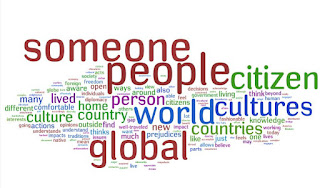 “That whenever any Form of Government becomes destructive of
these ends, it is the Right of the People to alter or to abolish it, and to
institute new Government, laying its foundation on such principles and
organizing its powers in such form, as to them shall seem most likely to [achieve]
their Safety and Happiness.
“That whenever any Form of Government becomes destructive of
these ends, it is the Right of the People to alter or to abolish it, and to
institute new Government, laying its foundation on such principles and
organizing its powers in such form, as to them shall seem most likely to [achieve]
their Safety and Happiness.





